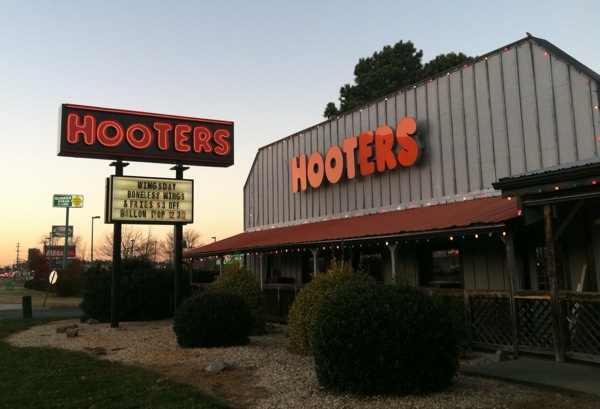A bankrupt Richmond restaurateur has thrown a legal jab back at a Midlothian bank, including an argument that hinges on font size.
Phil Cornett, who previously owned several local Hooters locations and other restaurants in the area, says a case filed against him by Bank of Virginia should be tossed out of federal court.
Bank of Virginia filed the case in March to try to prevent Cornett from using his personal bankruptcy to wash away $2.7 million in debt owed to the bank.
Cornett and his attorney argued that the font on the exhibits included in the bank’s initial filing is an “unreasonable small print size for a legal document.”
The argument added that the font is hard to read or is unreadable on certain loan-related documents.
“The small print size coupled with questions of readability suggest the lack of informed consent by the parties and therefore, the failure of basic contract formation,” Cornett’s camp said in court filings on April 3.
The bank’s main argument for pulling the debt out of bankruptcy is that Cornett allegedly obtained the debt using “materially false” financial statements. The bank claims it relied on those financial statements when it made two loans to two of Cornett’s business interests. One of those was Cornett Hospitality, through which he ran his once-thriving string of Mid-Atlantic restaurants.
The bank claims it learned that the financial statements were false through Cornett’s testimony at his personal bankruptcy hearings.
In firing back at the bank, Cornett argues that the case fails to include facts that show he made materially false statements. It also says the complaint doesn’t show when exactly the alleged statements were made, and that the bank hasn’t shown to what extent it relied on those statements in making its loan decision.
Cornett’s response also argues that the bank’s complaint doesn’t show that his alleged actions were done “with the intent to deceive” the bank.
Cornett and his attorney asked for several alternatives should the court decide not to toss out the case. He asks that either the bank’s initial allegations be stricken from the court record, that the bank be forced to file a more definite argument, or that the court extend the deadline for Cornett’s formal response to the suit.
Richmond attorney Leonard Starr represents Cornett in his personal bankruptcy case. He did not return a call by press time.
Bank of Virginia is represented in the case by Kaufman & Canoles attorney Paul Campsen.
The debt owed to Bank of Virginia is just a portion of the millions of dollars claimed by creditors in Cornett’s Chapter 7 personal bankruptcy case. (His business, Cornett Hospitality, also filed for bankruptcy.)
At one time, Cornett ran more than a dozen eateries in three states which, in addition to Hooters, included Topeka’s Steakhouse and Max & Erma’s.
A bankrupt Richmond restaurateur has thrown a legal jab back at a Midlothian bank, including an argument that hinges on font size.
Phil Cornett, who previously owned several local Hooters locations and other restaurants in the area, says a case filed against him by Bank of Virginia should be tossed out of federal court.
Bank of Virginia filed the case in March to try to prevent Cornett from using his personal bankruptcy to wash away $2.7 million in debt owed to the bank.
Cornett and his attorney argued that the font on the exhibits included in the bank’s initial filing is an “unreasonable small print size for a legal document.”
The argument added that the font is hard to read or is unreadable on certain loan-related documents.
“The small print size coupled with questions of readability suggest the lack of informed consent by the parties and therefore, the failure of basic contract formation,” Cornett’s camp said in court filings on April 3.
The bank’s main argument for pulling the debt out of bankruptcy is that Cornett allegedly obtained the debt using “materially false” financial statements. The bank claims it relied on those financial statements when it made two loans to two of Cornett’s business interests. One of those was Cornett Hospitality, through which he ran his once-thriving string of Mid-Atlantic restaurants.
The bank claims it learned that the financial statements were false through Cornett’s testimony at his personal bankruptcy hearings.
In firing back at the bank, Cornett argues that the case fails to include facts that show he made materially false statements. It also says the complaint doesn’t show when exactly the alleged statements were made, and that the bank hasn’t shown to what extent it relied on those statements in making its loan decision.
Cornett’s response also argues that the bank’s complaint doesn’t show that his alleged actions were done “with the intent to deceive” the bank.
Cornett and his attorney asked for several alternatives should the court decide not to toss out the case. He asks that either the bank’s initial allegations be stricken from the court record, that the bank be forced to file a more definite argument, or that the court extend the deadline for Cornett’s formal response to the suit.
Richmond attorney Leonard Starr represents Cornett in his personal bankruptcy case. He did not return a call by press time.
Bank of Virginia is represented in the case by Kaufman & Canoles attorney Paul Campsen.
The debt owed to Bank of Virginia is just a portion of the millions of dollars claimed by creditors in Cornett’s Chapter 7 personal bankruptcy case. (His business, Cornett Hospitality, also filed for bankruptcy.)
At one time, Cornett ran more than a dozen eateries in three states which, in addition to Hooters, included Topeka’s Steakhouse and Max & Erma’s.
